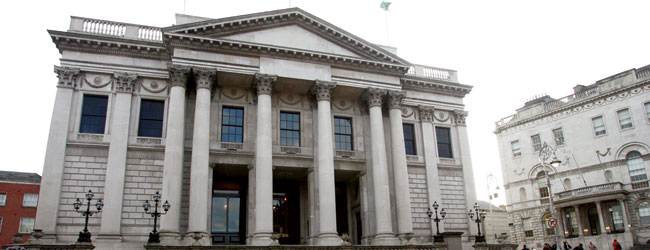9 September 2011
Democracy is not a load of rubbish
COUNCIL SKETCH | DUBLIN CITY COUNCILLOR MÍCHEÁL Mac DONNCHA
AN PHOBLACHT former editor Mícheál Mac Donncha reflects on his experience after four months as a Sinn Féin member of Dublin City Council.
AN PHOBLACHT former editor Mícheál Mac Donncha reflects on his experience after four months as a Sinn Féin member of Dublin City Council.
ON MONDAY NIGHT last (5th September), Dublin City Council voted in favour of a Sinn Féin motion opposing the threatened privatisation of the household bin collection. But such is the state of democracy in our city and our country that the City Manager and the officials who run the capital can simply ignore this vote of the public representatives and proceed with privatisation.
Under legislation passed by a previous Fianna Fáil/Progressive Democrats regime, virtually all powers relating to waste management were removed from elected councillors. This included the setting of waste charges, whether or not there are waivers for people on low incomes and even whether the service is provided by the council itself or is privatised. But councillors still vote on annual budgets which may contain these elements.
Our Sinn Féin motion stated that the council “in fulfilment of our public service responsibility to the citizens of Dublin and of our duty as an employer to our workforce, will retain as a council function the waste collection service and will oppose its privatisation”.
Not for the first time, we saw the discomfort of the Labour Party members, especially Labour Group Leader Paddy Bourke and his deputy, Dermot Lacey. These ‘leading lights’ spoke dimly about supporting public services but opposed the motion. The only argument Lacey could come up with was to accuse us of double standards because some Sinn Féin ministers in the Executive use party members as drivers!
Some Labour councillors actually supported the motion and it was passed by a majority of councillors. As the largest group on the council, and as a party in Government, Labour now have a responsibility to see that it is implemented. Will they allow the City Manager to proceed with privatisation under legislation (the Waste Management Act 2001) that Labour excoriated when it was introduced? Who was it said in 2001:
“What is happening here is an attempt to drive a legislative bulldozer through these democratic rights. Is it any wonder that democracy in this country is in such a poor state? We will go down a dangerous road by pursuing legislation in this manner as democratic rights are being taken from the public.”
The speaker was none other than Eamon Gilmore TD, then Labour Dáil spokesperson on Environment and Local Government!
(Labour Party people don’t like to be reminded of the past. At Monday’s council meeting I raised the call for the new children’s hospital to be named after Dr Kathleen Lynn, founder of St Ultan’s Hospital. As soon as I mentioned that she fought in 1916, Labour Group Leader Councillor Paddy Bourke boomed: “Oh, here we go again!”)
If bin privatisation goes ahead in Dublin City Council (as it has already in South Dublin and Fingal), it will mean more costs for householders, poorer pay and conditions for workers in private waste companies, and no protection for those on low incomes.
Management would be better served reducing wasteful spending instead of privatising services. For example, City Manager John Tierney indicated in the wake of the visit of the English queen that the council had been required to close the construction and renovation works at Smithfield during the visit, supposedly for security reasons. He estimated that this would cost the council €100,000. I tabled a question and the reply I got on Monday was that the cost recently agreed with the main contractor is a third as much again, at €130,000.
As it happens, it was a bin charges issue that helped trigger the events that resulted in this writer being co-opted to Dublin City Council. In 2009, then Sinn Féin Councillor Killian Forde voted to support a draft budget that made people on low incomes pay higher bin charges. This was against the mandate given to him by Sinn Féin and the electorate. As it turned out, Forde’s action was part of his move to join the Labour Party. He resigned his council seat earlier this year after he received only three votes at the Labour Party convention to select general election candidates in Dublin North-East.
Such are the fortunes of politics. The Fianna Fáil leader on the council, Mary Fitzpatrick, knows something of changing political fortunes. Now leader of a much-reduced group, she was not exactly a close comrade of Bertie Ahern and the ‘Drumcondra Mafia’ based around his St Luke’s HQ. There was much mirth in the council chamber on Monday night when, during an on-screen presentation on climate change, the famous image appeared of Bertie up to his knees in water during flooding in his constituency. All eyes turned to Mary Fitzpatrick. “When are you getting St Luke’s?” someone asked.
But my colleague Sinn Féin Councillor Séamus McGrattan had a better one. The issue of inadequate lighting on a statue of Our Lady in a green space opposite St Luke’s came up at an area meeting and Séamus quipped: “Bertie’s trying to keep Mary in the dark.”
If you didn’t laugh you’d cry — and for their craic and comradeship I’ll conclude by saying thanks to my fellow Councillors Larry O’Toole, Críona Ní Dhalaigh, Séamus McGrattan and Anthony Connaghan.
Follow us on Facebook
An Phoblacht on Twitter
Uncomfortable Conversations

An initiative for dialogue
for reconciliation
— — — — — — —
Contributions from key figures in the churches, academia and wider civic society as well as senior republican figures





